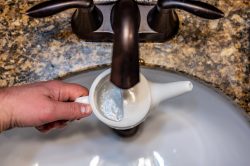 As spring unfolds, bringing vibrant blooms, millions prepare to face the challenges of allergy season, marked by sneezing, wheezing, and unyielding nasal congestion. Many people seek relief through the use of neti pots, which provide a drug-free solution by flushing out pollen and mucus with a saline rinse. However, studies indicate that tap water, when used in neti pots, may harbor organisms capable of causing rare, yet frequently fatal infections if not used correctly for nasal rinsing.
As spring unfolds, bringing vibrant blooms, millions prepare to face the challenges of allergy season, marked by sneezing, wheezing, and unyielding nasal congestion. Many people seek relief through the use of neti pots, which provide a drug-free solution by flushing out pollen and mucus with a saline rinse. However, studies indicate that tap water, when used in neti pots, may harbor organisms capable of causing rare, yet frequently fatal infections if not used correctly for nasal rinsing.
Neti pots are devices intended to clear out mucus and debris from the nasal passages using water. They are commonly used to relieve symptoms from nasal allergies, sinus problems, irritation from dry air, or colds. However, recent studies by the U.S. Centers for Disease Control and Prevention (CDC) have highlighted that using tap water in these pots for nasal rinsing can heighten the risk of acquiring rare yet severe infections caused by Acanthamoeba, tiny organisms that are prevalent in soil, water, and air.
These single-celled creatures can lead to various symptoms and are fatal in 82% of cases, although infections are uncommon, impacting only 3-12 people in the United States each year. Despite widespread exposure to Acanthamoeba, the number of people who actually fall ill remains low.
Acanthamoeba is responsible for several serious health conditions, including:
Acanthamoeba keratitis- an eye infection that threatens permanent vision loss, particularly in individuals who wear contact lenses.
Granulomatous amebic encephalitis- a severe infection of the brain and spinal cord that occurs in immunocompromised patients.
Disseminated infection- a pervasive infection that affects the skin, sinuses, lungs, and other organs, predominantly found in those with weakened immune systems.
The research focused on 10 immunocompromised patients with conditions such as HIV/AIDS, cancer or kidney disease, who had utilized neti pots and later developed Acanthamoeba infections. Seven of these patients survived, likely aided by the early intervention for concurrent sinus infections. Infections by Acanthamoeba, particularly those impacting the brain or central nervous system, are challenging to treat effectively. Unfortunately, most cases involving brain infections typically lead to death.
Nasal irrigation tools like neti pots, squeeze bottles, bulb syringes, and battery-operated water devices are deemed safe and effective when correctly maintained and used. However, the agency advises against using tap water for nasal rinsing, even though it’s safe for drinking. This is because stomach acid can neutralize microorganisms such as bacteria, amoebas and protozoa found in low quantities in tap water, but these can survive in the nasal passages and lead to severe infections. For nasal irrigation, it is recommended to use distilled or sterile water, boiling tap water for 3-5 minutes then cooled, or water filtered through a device capable of removing infectious organisms.
To minimize the risk of waterborne infections, it is essential to use uncontaminated water and also to maintain good hygiene practices. This includes washing your hands thoroughly, keeping the neti pot clean and dry, and adhering to the manufacturer’s guidelines for use.
To view the original scientific study click below:
Acanthamoeba Infection and Nasal Rinsing, United States, 1994–2022





